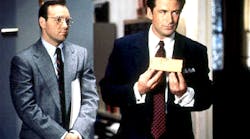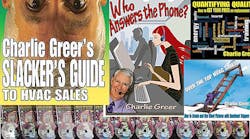This Valentine’s Day, some people will close the deal, others will attempt to close the deal, and still others will want to close the deal but will be afraid to try. You do not want to become part of that third group.
When I first started in business, I remember my boss gathering all us young guys together and telling us a story. He said, “We used to have a guy working here who was average-looking and didn’t have any more money than you do, but he dated a different woman every night and was never short on company.”
My boss went on to say, “I started following him after he’d leave here. He’d go down to the busiest intersection in town and proposition every woman who walked passed him. He got his face slapped multiple times, but he got a date every night.”
The message from my boss was to encourage us to at least attempt to close the sale. That is: directly ask for a potential customer’s business after making a presentation.
Why Not Close?
Many people in selling situations fail to attempt to close the sale. The two most common reasons salespeople and service technicians fail to close are fear of rejection and fear of seeming “high pressure.”
Fear of rejection indicates a lack of confidence. People want you to be confident, and confidence sells. Failing to attempt to close sends the wrong message: it says that you don’t sincerely believe your recommendations are on track with your prospects’ goals and that your product and price meet their requirements. If you honestly believe that, you’ll assume the sale.
Others are so afraid of coming across as “high pressure” that they won’t even make one attempt at closing. They don’t want to even be seen as “trying to sell someone something.” That is just stinkin’ thinkin’. Every business is selling something. The purpose of every interaction with every customer is to sell them something. Acting like you’re interacting with a customer to do anything other than sell something is disingenuous.
They’re ‘Just Getting Prices’
I remember showing up on a “free-estimate” type call for a system changeout, and the customer greeting me at the door with, “I just want you to know, I’m not buying anything today. I’m just getting bids.”
Whether they announce that at the front door or not, you should work under the assumption that that’s a customer’s mindset, so it doesn’t throw you off when it happens. People who try to throw up a roadblock at the front door are often the easiest to close on the spot. They’re putting up that line of defense before the conversation even gets started because they know they’re an easy sale.
This particular customer also had a built-in excuse to put off the decision because he was one-half of a married couple and his wife wasn’t home at the time.
I took what he said in stride and did not directly respond to it. In fact, without saying as much, I went along with it. For instance, after asking a few preliminary questions such as, “How long have you lived here?” I also asked, “Is it okay with you if I write all this down and keep a record of our conversation? That way, when you call me in a few years, we won’t have to go through all this again.” Later, after I used his ladder to get up into his attic to inspect his insulation and ductwork I asked, “Should I just leave this ladder here to make it easier for the next person you have come out here to give you an estimate?”
I typically do several things during the course of my calls that demonstrate that I am in no big hurry, nor am I concerned about my prospects talking with other contractors — which I am not. I firmly believe that when you are meeting customers’ desires, they will buy and the close of the sale will come about naturally.
At the same time, this particular customer gave me no buying signals whatsoever.
The Indirect Close
After my presentation, I asked him, “Is there any doubt in your mind as to the necessity of replacing your home’s heating and cooling system at this time?” He said no.
I asked, “Is there any doubt in your mind as to my ability, and the ability of my company, to do this job right for you, and that there is no way that having me do this for you could be a mistake?” He again said no.
“So then, as long as you can afford it, you’re going to want me to go ahead and do this for you?” He said yes.
I showed him the price, along with two different payment options, and asked, “Seem affordable?” He said yes.
I was in kind of a state of shock because, despite his earlier warning, it seemed to me that he had just bought. So I put out my hand and said, “Welcome to the family. You’ve made the right decision. You’ve done exactly what I would have done if I were in your position. You’re absolutely going to love it.”
Much to my surprise, he started vigorously shaking my hand and saying things like, “Okay! Okay! I was going to get other bids, but I’ll just go with you. Are you being honest with me? Do I need to get other prices?”
I said, “Yes, I’m being honest with you and no, you don’t need to get other prices.”
He said, “Okay! Thank you! Thank you very much!” The guy was actually thanking me for being a good closer!
You don’t always have to ask people to buy. You can ask them if seems affordable, or makes sense, or if what you’re offering is something they’d like to have. If you get any response other than a direct no, assume they’ve bought and congratulate them on their purchase.
Starting now, be like that guy my old boss used to talk about and give everyone you see an opportunity to buy, whether you’re getting all the buying signals or not, and you’ll never again be lonely on Valentine’s Day — or payday.











